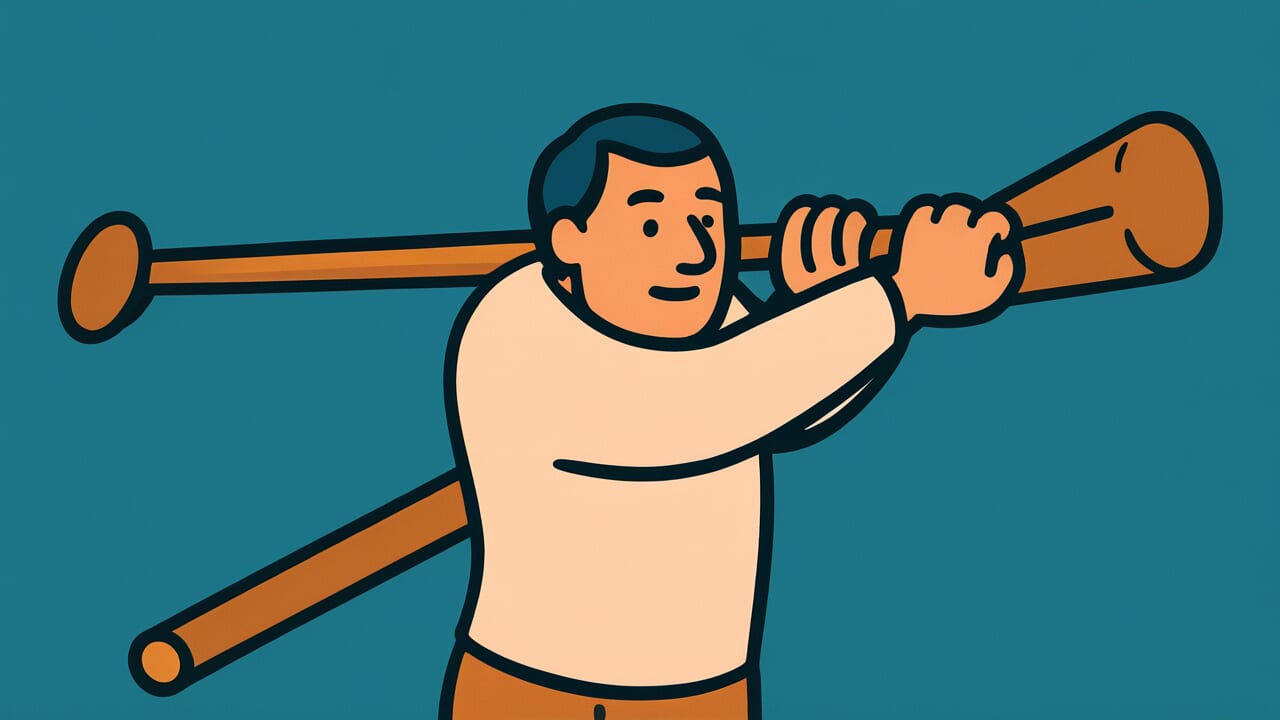How to Read “Stubbornness ends up under the stick”
jōbari wa bō no shita
Meaning of “Stubbornness ends up under the stick”
“Stubbornness ends up under the stick” means that being stubborn ultimately leads to loss and submission.
When you cling to your position and refuse to give in, you eventually get pushed into a worse situation. You end up having to back down in a humiliating way.
Things that could have been settled peacefully if you had been honest or apologized early on become much more costly. Your stubbornness makes the consequences far worse.
This proverb often applies to conflicts with bosses, superiors, or powerful people. It warns those who keep resisting despite being in a weak position.
People use it to say, “If you keep being so stubborn, you’ll end up in an even worse situation.” Today, it still reminds us about the dangers of inflexibility in organizations and negotiations.
Origin and Etymology
No clear written records explain the exact origin of this proverb. However, the words themselves reveal an interesting background.
“Jōbari” means stubbornly insisting on your position. “Under the stick” is the key phrase here. The stick likely refers to a tool used for punishment.
During the Edo period, criminals received beatings with sticks as punishment. This was called “chikei.” In samurai society, vassals who angered their lords could also be beaten with sticks.
“Under the stick” represents the humiliation of being physically beaten. It also symbolizes being forced to submit through power and authority.
The proverb teaches that continued stubbornness leads to harsher punishment. What could have been resolved with a simple apology becomes a severe penalty because of resistance.
It captures the power dynamics in human society. It shows what happens when you misjudge how far to push your pride.
Usage Examples
- I should have apologized back then, but stubbornness ends up under the stick—I ended up getting fired
- Continuing to oppose your boss is like stubbornness ends up under the stick, so you should back down here
Universal Wisdom
“Stubbornness ends up under the stick” offers deep insight into the fragility of human dignity and pride.
We all want others to acknowledge we’re right. We want to save face. When someone points out our mistakes, admitting it feels like self-denial. It’s painful.
That’s why people dig in their heels. They keep resisting even in unfavorable situations.
But this proverb teaches an ironic truth. The very act of protecting your pride can damage it even more.
What could have been resolved with a small concession grows into major humiliation. Human society has power structures. Ignoring this reality and pushing forward on pride alone leads to greater pain.
Our ancestors understood this psychological mechanism. True strength isn’t about never giving in. It’s about knowing when to step back and having that flexibility.
Fighting to protect your pride can actually hurt it the most. This paradox is why this proverb has endured for so long.
When AI Hears This
When you apply too much force to a pole, it doesn’t stand straight—it bends and collapses. In structural mechanics, this is called “buckling.”
What’s interesting is that the pole doesn’t break. Instead, at a certain critical point, it suddenly loses balance and gives way sideways.
According to Euler’s formula, thinner poles and weaker end supports cause buckling with less force. The essence of this phenomenon is “finding an escape route for energy.”
When compression force builds up, there comes a moment when bending sideways requires less energy than staying straight. Systems always seek the minimum energy state. Pressure beyond the limit causes collapse in unexpected directions.
The same principle works in human relationships. Continuous tension and excessive pressure don’t make people endure head-on. Instead, they suddenly collapse in completely different directions.
This appears as unannounced absences, sudden resignations, or complete relationship breakdowns. Like buckling, the collapse is sudden, not gradual.
In structural design, engineers ensure safety factors many times the expected load. Similarly, people and organizations need appropriate “slack.”
A state stretched too tight is the most fragile, both physically and psychologically.
Lessons for Today
This proverb teaches modern people about “the courage to step back.”
Today’s society values strong self-assertion. Never changing your opinion seems like proof of strength. But is real strength about being inflexible?
True strength means calmly assessing situations. It means responding flexibly when necessary.
Conflicts with bosses at work, arguments with family, misunderstandings with friends—our daily lives overflow with moments that tempt us to be stubborn.
When those moments come, remember this proverb. What are you really trying to protect by being stubborn right now? Are you about to lose something more important because of temporary emotions?
Stepping back isn’t losing. It’s a wise choice that avoids greater loss, preserves relationships, and keeps future possibilities open.
Don’t fight to protect your pride. Instead, step back sometimes to protect what truly matters. That flexibility is the wisdom needed to navigate modern life.
What is truly worth protecting in your life?



Comments